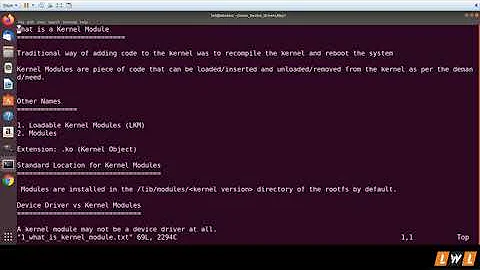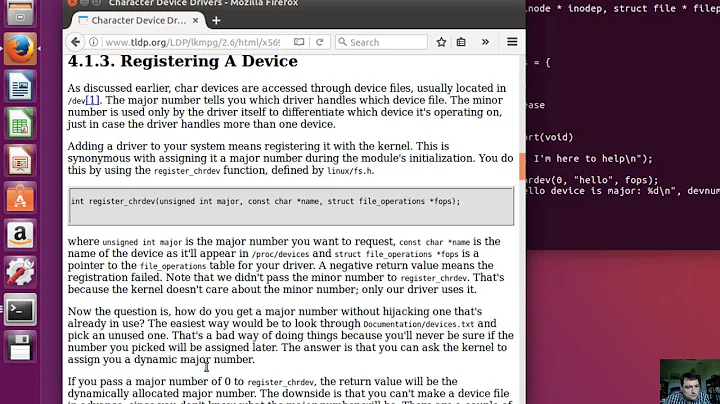What is the difference between module_init and init_module in a Linux kernel module?
Solution 1
If you look at the definition of the new functions:
/* Each module must use one module_init(). */
#define module_init(initfn) \
static inline initcall_t __inittest(void) \
{ return initfn; } \
int init_module(void) __attribute__((alias(#initfn)));
/* This is only required if you want to be unloadable. */
#define module_exit(exitfn) \
static inline exitcall_t __exittest(void) \
{ return exitfn; } \
void cleanup_module(void) __attribute__((alias(#exitfn)));
You'll see it ensures that the right boilerplate is included so these special functions can be correctly treated by the compiler. It's what the internal API of Linux does, it evolves if there are better ways of solving the problem.
Solution 2
What is the advantage of [module_init] in Kernel 2.6
module_init also exited in 2.4, mind you.
It adds the necessary boilerplate to initialize the module and run the entry function when the module file is compiled into the kernel rather than as a module.
Solution 3
One advantage is readability. cdrom_init() instantly tells you that it's the init() call for the cdrom driver.
Related videos on Youtube
Karthik Balaguru
/etc/profile !! There is always something to do !! Embedded and communication technologies ! fullName() { Karthik Balaguru } Primary MAC address - KA:RT:HI:K.:BA:LA:GU:RU:00:7@:GM:AI:L.:CO:M Secondary MAC address - KA:RT:HI:K.:BA:LA:GU:RU:00:1@:GM:AI:L.:CO:M All the views and opinions expressed are my own. This is done at "free-time", not as a representative as any company or my employer.
Updated on April 27, 2022Comments
-
 Karthik Balaguru about 2 years
Karthik Balaguru about 2 yearsI have been trying to port few linux drivers and realized that there is substantial difference between kernel version 2.4 and 2.6 of linux.
In the 2.4 version of kernel, the module programming was as below -
#define MODULE #include <linux/module.h> #include <linux/kernel.h> int init_module(void) { printk(KERN_INFO "Hi \n"); return 0; } void cleanup_module(void) { printk(KERN_INFO "Bye \n"); }But, with the 2.6 version of kernel, the following has to be done for modules -
#include <linux/init.h> #include <linux/module.h> #include <linux/kernel.h> static int hi_init(void) { printk(KERN_ALERT "Hi \n"); return 0; } static void hi_exit(void) { printk(KERN_ALERT "Bye \n"); } module_init(hi_init); module_exit(hi_exit);What is the advantage of such changes in Kernel 2.6 and Why was that change required in kernel 2.6 of linux ?
-
user2311046 over 10 yearsHere is a very nice explanation to module_init: stackoverflow.com/questions/18605653/…
-








![[Linux Kernel] Cấu trúc module đơn giản](https://i.ytimg.com/vi/RhcMNkI-OVc/hq720.jpg?sqp=-oaymwEcCNAFEJQDSFXyq4qpAw4IARUAAIhCGAFwAcABBg==&rs=AOn4CLArZA_rKemUF68xacsvkQBs52C9TQ)


